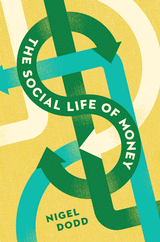Nigel Dodd’s The Social Life of Money is an original and comprehensive contribution, finds Philipp Degens. It is a must-read for any scholar interested in the topic as it helps to better understand the nature of money –or, of monies. Also, surely many future in-depth case studies of particular forms of money will gain enormously from this work.
 The Social Life of Money. Nigel Dodd. Princeton University Press. 2014.
The Social Life of Money. Nigel Dodd. Princeton University Press. 2014.
Money is ubiquitous. We all take money for granted – not in the sense of having enough money in our pockets or our bank accounts, but in the sense that we weigh objects, goods, services, claims, maybe even time in a monetary standard. We seldom ask ourselves what money is. Yet, especially in times of economic crisis, money does increasingly become the object of debate. Part of this debate takes place within conventional economic theory and focuses on monetary and fiscal policy issues. Beyond these issues, however, there are more fundamental concerns about the very nature of money, questions about the value of money, how it works and how it is sustained. These questions evoke perplexities that seem to render money almost incomprehensible.
Nigel Dodd, Professor in the Sociology Department at the LSE, explores the social life of money and tackles many of these questions in his new book. His book expands the discussion on money, particularly by linking it to a strand of thought that is commonly regarded as being external to a theory of money. Although his own approach is sociological, he draws on economic, philosophical, anthropological, linguistic and other disciplinary concepts. This way, Dodd permanently opens up and broadens our understanding of money. By doing so, he goes well beyond orthodox and heterodox economic theories of money.
The book covers a few key themes that I’d like to stress here particularly. Throughout the book, Dodd challenges the idea that there is or might be money simpliciter, or just one kind of money, and particularly that such money would be an objective ‘thing’ bearing value in itself. One of his key influences is Georg Simmel’s philosophy of money. Following Simmel, Dodd explores money as a “claim upon society”. Money expresses a form of debt between an individual and “society” as a whole. Dodd then further investigates issues rising from this notion, e.g. what is the basis for such claim? And what exactly is society in this sense? He argues, drawing on Keith Hart, for a flexible understanding of “society” that resembles the scale of a particular monetary form. It might be the state or even the nation, but it also might refer to a particular community of users.
The argument, in brief, is that money is not a thing, but a process. It consists of social relations. Just like Simmel emphasized the process of sociation (as opposed to society as something fixed or stable), Dodd holds a fluid view of money and focuses on the process by which money is actively (re)created by its users. It is not an objective entity, but it has social life which rests on, for example, its underlying political, economic, and social framework. Money is never independent of social and political relations, or of culture. It is based on trust and social values. In practice, it might be materialized in precious metal, paper notes, book entries, bits and bytes, shells or whatever form it takes – yet it still derives its value and its meaning from the social relations among its users.
Dodd takes many forms and kinds of money –past, present and imagined– into account. The fact that he conceptually accepts monetary pluralism paves the way for conceiving of multiple opportunities to re-imagine and re-organise money as a means of social progress. Whereas classical social thought on money tends to regard money as malevolent and highlights, by and large, money’s capacity to threaten and erode society and culture, Dodd explores money’s progressive potential. Money, this is one of the key messages, can be organised in a beneficial way, it can be used as a means to reach economic, social, or political goals. However, not one single form of money can serve all purposes at the same time. Dodd discusses various alternatives like, for example, time banks and LETS on a local level, yet also ‘global’ alternatives like bitcoin and freicoin. This openness to and curiosity for utopian and monetary reform concepts is one of the great strengths’ of the book. Dodd asks what such conceptions might offer for a general understanding of money, yet also what they might offer from a normative perspective, how money should look like. In fact, Dodd slightly favours a flexible monetary system with various forms and kinds of co-existing monies. For him, the solution to our monetary crisis is not to develop an alternative form of money, but to develop plenty.
This original and comprehensive book is organized in eight chapters, each of which deals with a particular category. These are origins, capital, debt, guilt, waste, territory, culture and utopia. While some of the themes (e.g. capital; debt, origins, territory) seem to be necessary ingredients of any book on money (although dealt with from different perspectives), others are rather unexpected. On a first glance, the reader might even be surprised by the titles of some of these chapters. Yet Dodd unfolds their key relevance throughout the book and gives plenty of cross references to guide the reader. The chapters on guilt and waste are probably best suited to exemplify the distinctiveness of this book and how it differs from most other works on money. Dodd offers compelling insights from psychoanalytical approaches which link money to excrement and the unconscious. Then, following Bataille’s concept of the general economy, Dodd invites us not to imagine scarcity, but surplus as the fundamental economic problem. Unusual as it is, such a conceptual shift allows for a new perspective on the Eurozone’s transfer union, as the discussion in the book exemplifies thoroughly.
Dodd writes with great skill. The style is compelling and one enjoys reading the book. At the same time, it is not an easy read. It is demanding, and it takes time to follow Dodd carefully. This is something that inevitably comes with the broadness of Dodd’s approach. Dodd raises questions even more than giving answers, and he draws on a huge range of scholars of which many are not commonly regarded when it comes to money.
Some readers might miss a narrower conclusion and/or a more formal synthetisation of the complex and original discussion. Yet Dodd does not aim to offer one coherent approach to money – on the contrary, he severely doubts that such an approach might even exist. As we have seen, just like money can take various forms, there are various theories on money all of which have something valuable to say. The book proves how fruitful and intriguing it is to take different perspectives and stances on this polymorphic phenomenon. Dodd rejects overly narrow concepts of money that theorize some monetary forms out of sight (e.g. neochartalist approaches focusing on money of account as the defining feature of moneyness). In this sense, the book is a strong argument for diversity in the theory of money.
To repeat: yes, the book is demanding. But it is far more rewarding. Some might not be inclined to accept every argument Dodd develops – yet for sure this brilliant book helps reconsidering views, opinions and theoretical claims on money that might be taken for granted too easily. It is a must-read for any scholar interested in the topic as it helps to better understand the nature of money –or, of monies. Also, surely many future in-depth case studies of particular forms of money will gain enormously from this work.
This review is published with permission from the Researching Sociology at LSE blog.
Watch Nigel Dodd in discussion about his book at a special LSE event.
Philipp Degens is a PhD student and research fellow in the Department for Co-operative Studies at the University of Cologne.








2 Comments